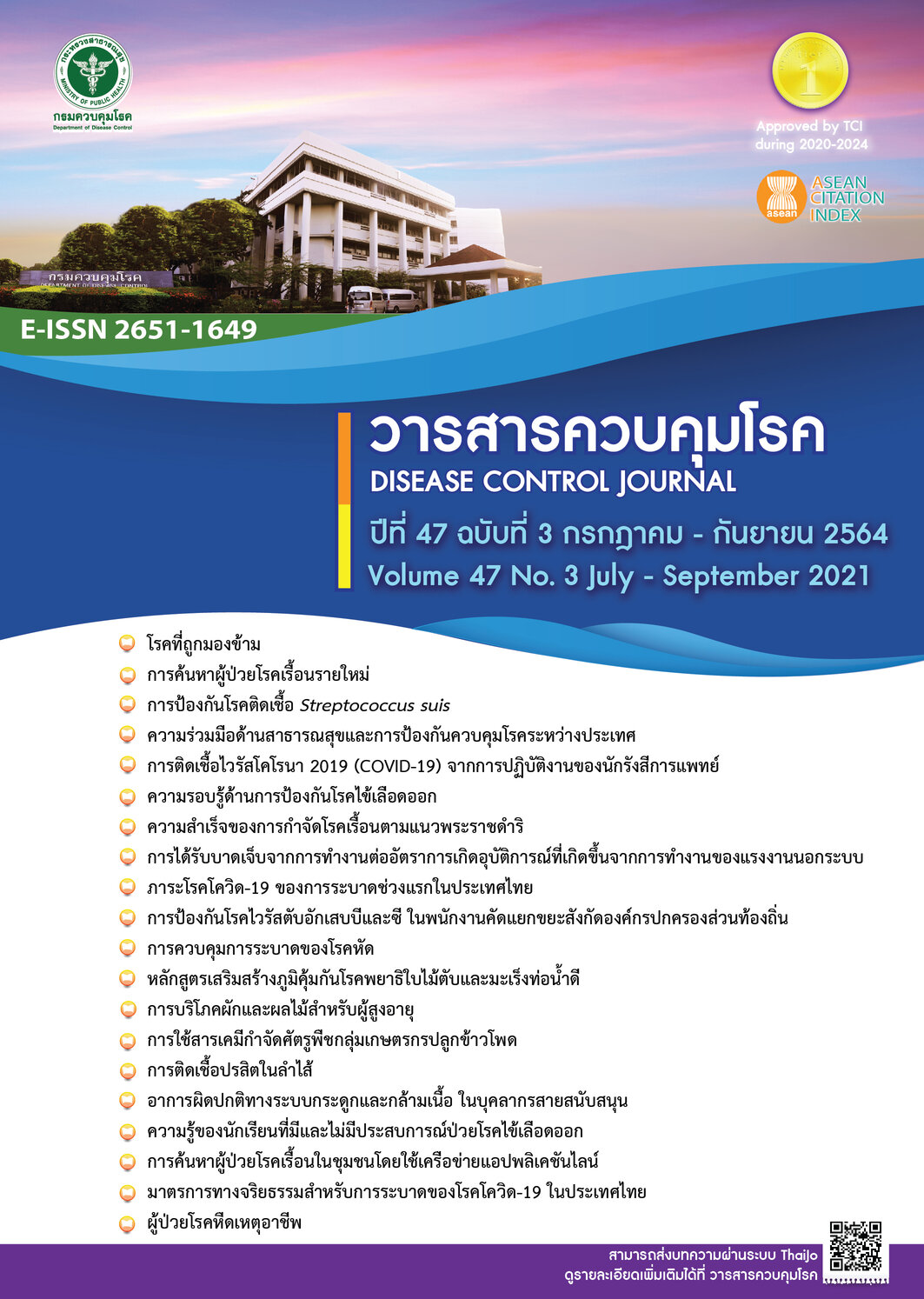Satisfaction of clients towards the program recommending consumption of fruits and vegetables for the elderly
DOI:
https://doi.org/10.14456/dcj.2021.50Keywords:
Satisfaction, recommend program, consumption vegetables, vegetable and fruit, elderly, Healthcare, WellnessAbstract
This research aims to 1) develop a program to encourage consumption of fruits and vegetables for the elderly, and 2) estimate client satisfaction. A sample group in this research consists of is 30 elderly clients who received health care services at Ban Khao-Tao Health Promotion Hospital during November 2019. Participants were recruited by simple random sampling. Tools used in this research include the program recommending consumption of fruits and vegetables for the elderly and a client satisfaction survey questionnaire. Data analysis was performed using statistical method including frequency, mean, percentage and standard deviation. Findings from this study indicated that 1) overall performance of the program recommending consumption of fruits and vegetables for the elderly was rated as good. The assessment topics are arranged in descending order as follows: ability to function as intended, ability to meet the clients’ needs, ease of use, and security; 2) the satisfaction assessment results were rated as very good. The assessment topics are arranged in descending order as follows: benefits from using the program, with the mean value of 4.43(S.D.=0.34); ability to work as per the program functional areas, with the mean value of 4.36 (S.D.=0.31); and 3) design area, with the mean value of 4.32(S.D.=0.16). In conclusion,the program can provide useful and appropriate recommendations to meet the clients’ needs, including the recommendations on the fruits and vegetables that should be consumed by the elderly population in order to live a healthy life.
Downloads
References
Changbumrung S, Chittinan S. Food and nutrition for the elderly. In: Kriengyot W, Panwichitsiri K, Yamprasit U, Chaowalitkun N, Sukhumaltrakul K, Butyee C, et al, Food and nutrition knowledge for all ages. Nonthaburi: Food and Drug Administration; 2016. (in Thai)
Ricci F, Rokach L, Shapira B. Introduction to recommender systems handbook. In: Ricci F, Rokach L, Shapira B,Kantor PB, editors. Recommender systems handbook. New York: Springer; 2011.
Li YM, Hsiao HW, Lee Y. Recommending social network applications via social filtering mechanisms. Information Sciences. 2013;239:18-30.
Jannach D, Zanker M, Felfernig A, Friedrich G. an introduction. In: Jannach D, Zanker M, Felfernig A, Friedrich G, editors. Recommender Systems. Cambridge: Cambridge University; 2010.
Balabanovic M, Shoham Y. Combining content-based and collaborative recommendation. Communications of the ACM. 1997;40(3):66–72.
Shambour Q, Lu J. Integrating multi-criteria collaborative filtering and trust filtering for personalized recommender systems. Proceeding of IEEE Symposium on Computational Intelligence in Multi criteria Decision Making (MDCM); 2011 May; IEEE; 2011. p. 44-51.
Chanrueang S. Health promoting hospital: alternative or primary way of thai health system [Internet]. [cited 2019 Feb 20]. Available from: https://www.hfocus.org/content/2015/07/10346 (in Thai)
Kerddonfaek C. Menopause Herbs. Bangkok: Seven Printing Group; 2007.
Mooney RJ, Roy L. Content-based book recommending using learning for text categorization. Proceedings of the 5th ACM Conference on Digital Libraries; 2000 June; San Antonio, Texas. 2000. p. 195-240.
Sripalung W, Sriurai W. The development of recommender system for E-library by using collaborative filtering and user profile. Srinakarinwirot University Journal of Science and Technology. 2017;9(18):150-64. (in Thai)
Phutthaisri B. Restaurant recommender system using collaborative filtering and content base filtering: a case study of Phranakorn Sri Ayutthaya [thesis]. Bangkok: King Mongkut's University of Technology North Bangkok; 2011. (in Thai)
Phantunin R, Chirawichitchai N. Personal recommender system based on agglomerative clustering together with user-based and item-based collaborative filtering methods. Rajamangala University of Technology Thanyaburi Research Journal. 2020;19(1):103-12. (in Thai)
Panawong N, Snae J. Search system for attractions in Thailand with ontology and name matching. Journal of Information Science and Technology. 2010;1(2):60-9. (in Thai)
Van Meteren R, Van Someren M. Using content-based filtering for recommendation. Proceedings of ECML 2000 Workshop: Machine Learning in New Information Age [Internet]. 2000 [cited 2019 Aug 14]: 47-56. Available from: https://pdfs.semanticscholar.org/4a57/e0f0641b7a70fece89c14fbf5030869ededb.pdf?.
Tomasoongneun S. Efficacy of nutrition education in elderly clinic, Medical journal of Srisaket Surin Buriram hospitals. 2011;26(2):309-17. (in Thai)
Chanpila T, Sirisook V, Phukao D, Rojroongwasinkul N. The associations of moods, perceived food quality, food satisfaction and food intake among: The elderly in an elderly Social Welfare Center. Proceedings of the 34th National Graduate Research Conference [Internet]. 2015 [cited 2018 Sep 7];2015-2025. Available from: https://gsbooks.gs.kku.ac.th/58/the34th/pdf/HMP15.pdf. (in Thai)
Kittipron M. Educational recommender systems and machine learning. Journal of Information Science. 2019;37(4):92-109. (in Thai)
Rojanaprapha W. Behavioral of using technology affecting the happiness levels of the elderly in Bangkok Metropolitan. Suan Dusit Graduate School Academic Journal. 2017;13(1):125-48.
Downloads
Published
How to Cite
Issue
Section
License
Articles published in the Disease Control Journal are considered as academic work, research or analysis of the personal opinion of the authors, not the opinion of the Thailand Department of Disease Control or editorial team. The authors must be responsible for their articles.






